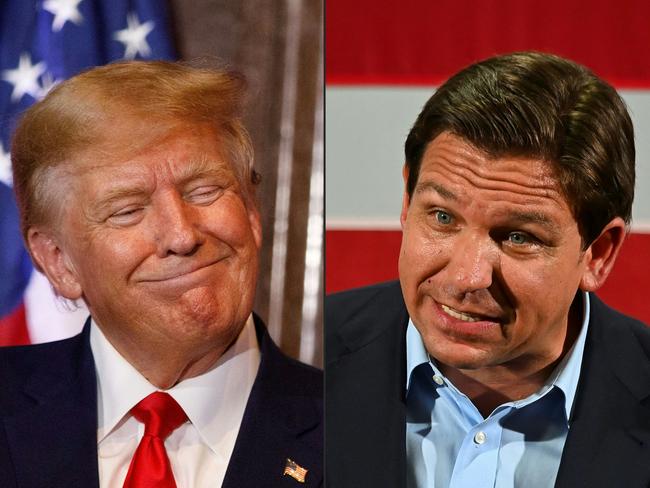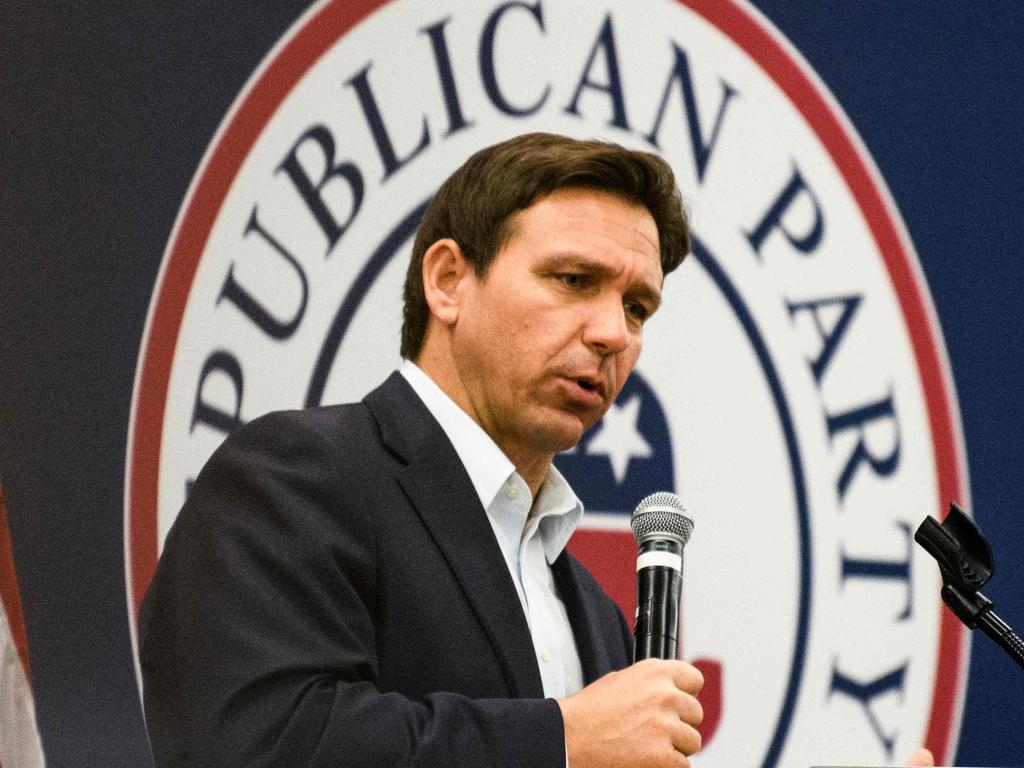Florida governor Ron DeSantis may be Republicans’ lesser evil
The Florida governor is more likely to beat Joe Biden than Donald Trump in a White House race but first he has to get through the primaries.

We’ll also get a better understanding of just how serious a candidate DeSantis really is. He was comfortably re-elected to the governorship of Florida in 2022 despite Trump candidates across the country underperforming. It was the moment Trump turned on his one-time protege, childishly labelling him “Ron DeSanctimonious”.
For those who don’t know much about DeSantis, make no mistake; he’s a hard-right American conservative. And he can be outlandish, which explains why he was once a Trump favourite.
DeSantis supports extremely restrictive access to abortion in his home state, and easy access to firearms. And he’s not afraid to take centrestage arguing right-wing causes as part of the culture wars; for example, standing up to “left-wing agendas” on university campuses and in schools.
Australians need to remember that our compulsory voting system coupled with preferential voting drives politics to the centre.
It is very different in the US. In many respects both Republicans and Democrats are further to the right than Australia’s two major parties.
The Republican establishment is likely to circle around DeSantis, especially if he appears to be the only candidate capable of stopping Trump’s comeback, a case of supporting the lesser evil.
But establishment party support means little in the primaries showdown. The base has the lion’s share of the say in that process, and Trump has form unpicking Florida governors with establishment support. Jeb Bush went from serious contender to road kill in the 2016 presidential race, as Trump used his trademark invective to tear down the mildly spoken former governor.
To be sure, DeSantis isn’t mildly spoken; far from it. And he knows Trump will be coming after him. Were DeSantis not taking on Trump, his abrasive style would likely be frowned on by the party establishment. He would be the outsider they feared, with a blunt turn of phrase lacking nuance.
But, compared with Trump, DeSantis is a Socrates of the modern world – that’s how deep the US political discourse has sunk. And we need to remember the US is a far more religiously conservative nation than we ever have been, much less are now. What you see up and down the east and west coast of the US doesn’t represent large swathes of the population living elsewhere. The tourist’s view of the US can’t comprehend its mainstream political culture.
DeSantis’s biggest challenge is defeating Trump in the primaries. He’s more likely to topple Joe Biden at a general election than defeat Trump in the preliminary showdown. Even though Trump probably can’t win the general election against Biden or indeed almost anyone else Democrats might throw up, his supporters may back him anyway.

Trump appeals to voters who feel let down by government, let down by Republicans, dictated to by elites and shut out of opportunities mainstream Americans used to believe were within their grasp. This is now a large cohort of the Republican base.
Given Trump’s backstory, he always has been an odd fit as the champion of the mainstream, but the former president knows how to stir up resentment. It is a skill DeSantis also has, but using it to his advantage in a contest against Trump will be difficult.
Analysts had thought primary voters would be strategic, supporting DeSantis as a younger alternative to Trump capable of toppling Biden. Not to mention also able to serve eight years in the White House instead of just four, which Trump is limited to courtesy of his already completed first term.
But a plethora of recent polls have Trump way out in front, despite his ongoing legal problems and salacious stories about his personal affairs. DeSantis backers will be hoping that gap can be narrowed now that he finally has declared he’s running. I say finally because having waited until now there is a risk it’s already too late to rebuild support, Trump being such a larger than life figure.
At just 44, DeSantis was slow to nominate formally; declining to do so to focus on a run in four years must have been appealing, avoiding a showdown with Trump or an incumbent president. But the unknowns attached to waiting forced DeSantis’s hand. Leaders need to take their chances when opportunities present.
Despite the hardline positions DeSantis holds on many issues, he’s more capable of winning over non-aligned centrist voters than Trump ever could, especially when pitted against Biden, who will be nearly 82 when the 2024 election rolls around – a generational contrast Trump doesn’t offer.
But swinging voters have little or no say in Republican primaries. DeSantis could be a distant memory on the national stage by the time of the general election if Trump has his way. Even if DeSantis lives up to the hype, a contest against Trump will be vicious, and to win it DeSantis will need to emphasise his policy and personal views that appeal to the base.
This risks turning off the centrist voters he needs to support him, not Biden, at the general election. A race to the right in the primary might incline many unaligned voters to stick with the Democrats or not bother to turn out to vote at all. Remember, voting isn’t compulsory in the US.
Either scenario is sub-optimal for DeSantis, but he can’t afford to look that far ahead or he’ll lock in a primary defeat.
Meanwhile there is every chance that Biden is selected to run as the Democrat candidate for president in a coronation, not a contest, as is often the case for incumbents. Not only would this save the Democrats vast amounts of campaign funds, it also avoids them tearing themselves apart before turning their collective attention to the Republicans.
It’s an advantage Biden might need given the state of the US economy. Rising interest rates designed to put downward pressure on stubbornly high inflation risk causing a recession. No incumbent enjoys arguing their case for re-election when the economy is struggling. Winning an election during a recession could be Biden’s burden next year. It will be a sharply bigger burden to bear if he’s taking on DeSantis instead of Trump.
Peter van Onselen is a professor of politics and public policy at the University of Western Australia and Griffith University.








Now that Republican Florida Governor Ron DeSantis has formally announced he’s running for US president, we’ll soon see if the polling resurgence Donald Trump has enjoyed despite numerous controversies is sustainable.